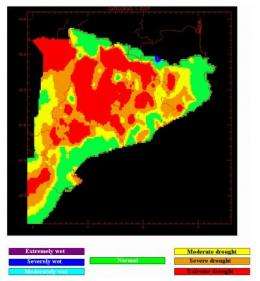Risk of drought in Northeastern Spain is exaggerated by the press

Researchers from the University of Barcelona (UB) have, for the first time, analysed all the articles published in the La Vanguardia newspaper between 1982 and 2007 linked to natural hazards, climate change and sustainable development. Over 25 years the press devoted more headlines to forest fires and droughts, even though floods are much more frequent and cause more damage.
"If the press focus more on forest fires and droughts, then people also become more aware of these events, to such an extent that they are deemed a more significant hazard in the area and more frequent occurrences than they really are", Carme Llasat, main author of the article and researcher at the Department of Astronomy and Meteorology at the UB, explains to SINC. "On the positive side, the substantial press coverage has brought about a change of attitudes in favour of saving water", explains the expert.
The study, published in the Natural Hazards and Earth System Sciences journal, points out that water shortage is a natural hazard with increasingly important social implications. "The sheer quantity of articles in the regional press reflects a growing awareness of water shortage, as well as changes in society's understanding of the use of water resources and the use of this issue as a factor for political confrontation", claim the experts.
The research stems from the hypothesis of previous sociological studies that justify the press as a means to mould social perception of hazardous situations. "It is a unique study as it collates all the newspaper articles on these subjects over 25 years", states Llasat.
For severe meteorological phenomena, the researchers have completed their research with articles published in El País, El Periódico de Catalunya and other local Catalan newspapers.
Having collated and analysed over 14,200 articles, 12,584 of which were from La Vanguardia, the team states that "for every flood the press generates 5.5 news stories", while for fires and droughts "each occurrence generates an average of 3.9 stories".
Snowfall, a very rare phenomenon in Catalonia, generates more than six news stories each time it occurs. "Being less common and more eye-catching, people get the impression that the event has been more severe because there is so much information", points out the researcher. The study also reveals a much more abrupt increase in media coverage on climate change.
A database of natural hazards
The second objective of the research is for the press to be an organised source of information to complement the database on natural hazards.
"In its application, however, factors that hinder the homogeneity of the source from a scientific point of view, such as elections, holiday periods or the impact of other current news, must be considered", say the experts.
This Access database that has been created off the back of the study allows people to search for meteorological phenomena in the region. "For example, now that there have been snowfalls, if we want to know if they have been the most significant in recent years, we can look it up", states Llasat.
More information: M.C. Llasat, M. Llasat-Botija, L. Lopez, 'A press database on natural risks and its application in the study of floods in Northeastern Spain', Natural Hazards and Earth System Sciences 9 (6): 2049-2061, 2009.
Provided by FECYT - Spanish Foundation for Science and Technology















